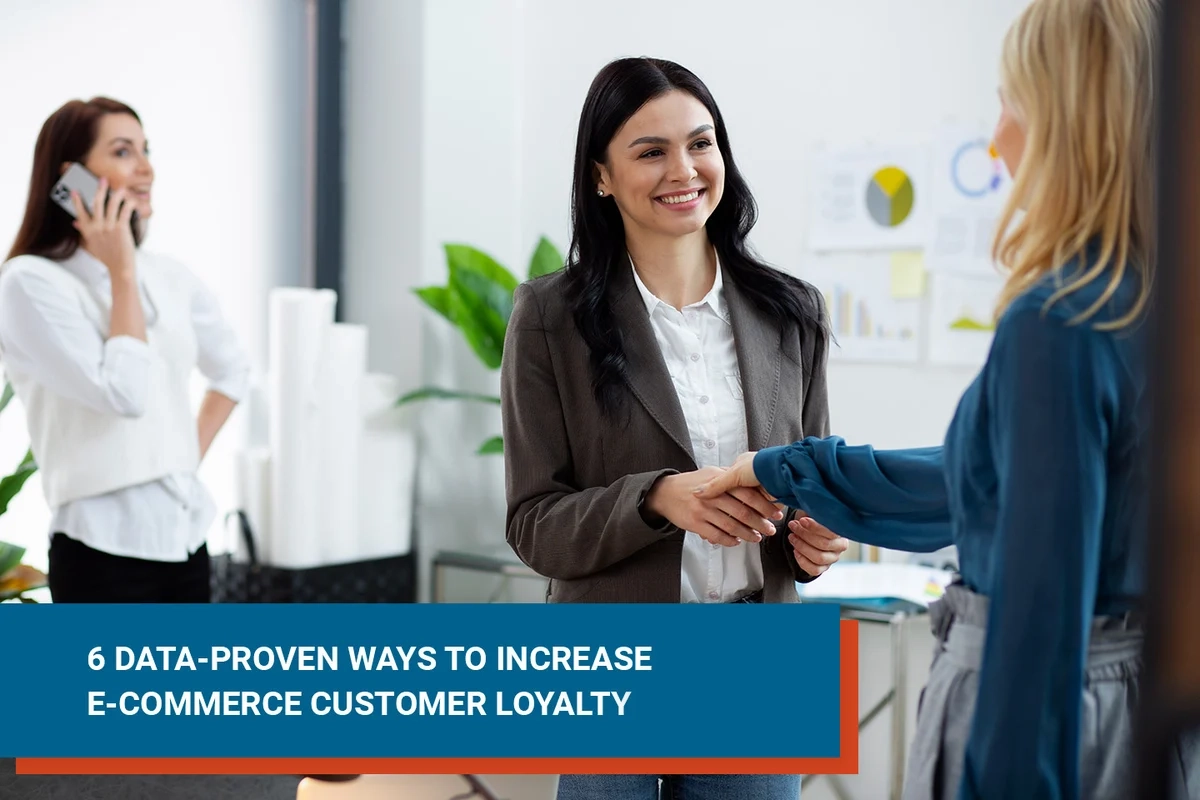Your guide to increasing customer lifetime value on Shopify
 Igor Krasnykh
·
4 minute read
Igor Krasnykh
·
4 minute read
For B2B businesses, long-term customer relationships are the key to sustainable growth. B2B businesses can thrive on repeat orders, ongoing partnerships, and increased order values over time. However, to fully capitalize on this potential, businesses need an eCommerce platform that not only supports but enhances their customer relationships.
Shopify has emerged as a powerful solution for B2B eCommerce, providing robust tools to streamline operations, improve customer experience, and drive revenue growth. With Shopify’s advanced features, businesses can optimize their online presence, automate processes, and create a seamless purchasing experience that keeps customers coming back.
B2B businesses can increase Customer Lifetime Value (CLV) using Shopify. As a Shopify Select Partner, our expert team helps businesses like yours optimize Shopify strategy, maximize conversions, and boost revenue. In our guide, we’ll discuss the benefits of Shopify for B2B companies, why CLV is crucial for success, and practical tactics to maximize it. With these actionable insights, you can enhance your business.
The benefits of Shopify for B2B businesses
1. A unified platform
One of the biggest advantages of Shopify for B2B businesses is its ability to support both B2B and Direct to Consumer (DTC) operations from a single platform. Many businesses sell to both consumers and wholesale buyers, and Shopify Plus provides the flexibility to manage different pricing, payment terms, and customer experiences within one system. This means businesses don’t have to juggle multiple platforms, reducing complexity and operational inefficiencies.
2. Scalable and customizable features
Shopify’s ecosystem is built to grow with businesses. Whether you are a small B2B business or an enterprise-level company, Shopify offers scalability without compromising performance. With customizable themes, APIs, and integrations with enterprise resource planning (ERP) and customer relationship management (CRM) systems, businesses can create a tailored experience that meets their specific needs.
3. Streamlined B2B ordering and payments
B2B transactions are often more complex due to bulk orders, negotiated pricing, and specific payment terms. Shopify makes it easy to manage these intricacies with features like custom pricing, net payment terms, and wholesale catalogs. Shopify’s automation tools help streamline order processing, invoicing, and payments, reducing manual work and improving efficiency.
4. Advanced analytics for data-driven decisions
Shopify provides robust analytics tools to help businesses track sales, monitor customer behavior, and measure customer retention. With detailed insights into purchasing patterns and product performance, businesses can make data-driven decisions to enhance their offerings and maximize customer lifetime value.
Why customer lifetime value matters
1. Maximize revenue without increasing acquisition costs
Customer acquisition is expensive, and businesses that focus solely on bringing in new customers often struggle with profitability. Increasing customer lifetime value allows businesses to generate more revenue from their existing customer base, improving overall return on investment (ROI) without constantly spending on acquisition.
2. Strengthen customer relationships
When businesses prioritize CLV, they focus on providing long-term value to their customers rather than just making one-time sales. This leads to stronger relationships, increased trust, and higher customer satisfaction—key factors that contribute to repeat purchases and brand loyalty.
3. Competitive advantage in a crowded marketplace
B2B markets are competitive, and businesses that retain customers for longer gain a significant edge. By optimizing customer experience and nurturing relationships, companies can differentiate themselves from competitors who rely primarily on one-time transactions.
4. More predictable revenue streams
A strong CLV strategy ensures consistent revenue generation over time. When businesses have a solid base of repeat customers, revenue becomes more predictable, allowing for better financial planning and investment in growth initiatives.
5 tactics to increase customer lifetime value with Shopify
1. Personalize the customer experience
Shopify enables businesses to deliver personalized recommendations, custom pricing, and targeted promotions based on customer behavior and purchase history.
Custom pricing and discounts: Shopify Plus allows businesses to set tiered pricing and offer exclusive discounts for specific customer groups, making customers feel valued.
AI-powered recommendations: Apps like Shopify Flow and AI-driven product recommendation tools help present relevant products to customers, increasing average order value.
Personalized email marketing: Shopify integrates with email marketing platforms like Klaviyo and ActiveCampaign, enabling automated, personalized email sequences based on customer activity.
2. Implement a customer loyalty program
Loyalty programs incentivize repeat purchases by rewarding customers for their ongoing engagement. Shopify supports various loyalty and rewards programs through integrations like Smile.io and LoyaltyLion.
Points-based rewards: Customers earn points for purchases, referrals, and social media engagement, which can be redeemed for discounts or perks.
Tiered loyalty programs: Offer exclusive benefits to top-tier customers, encouraging higher spending and long-term commitment.
Subscription-based incentives: Shopify supports subscription-based models, allowing businesses to create VIP memberships with exclusive discounts and early access to new products.
3. Provide exceptional customer support
B2B buyers require reliable support, especially when dealing with high-value transactions and complex orders. Shopify helps businesses enhance customer service with tools like live chat, help desks, and automated responses.
Live chat and AI chatbots: Shopify integrates with apps like Gorgias and Zendesk to provide instant responses to customer inquiries, reducing friction in the buying process.
Self-service portals: B2B customers can access order history, invoices, and tracking information through Shopify’s customer portals, enhancing transparency and convenience.
Proactive engagement: Businesses can use automated follow-ups to check in with customers, offer assistance, and encourage reorders.
4. Optimize the checkout and reordering process
A smooth and efficient checkout process encourages repeat purchases. Shopify’s features help businesses reduce friction and make reordering easier for B2B buyers.
One-click reordering: Shopify enables customers to quickly reorder their previous purchases, saving time and effort.
Flexible payment terms: Businesses can offer net payment terms, installment plans, and multiple payment options to accommodate B2B purchasing needs.
Automated workflows: Shopify Flow allows businesses to automate tasks like sending reminders for replenishments or abandoned cart recovery emails.
5. Expand product and service offerings
Diversifying offerings helps businesses stay relevant and increase revenue from existing customers. Shopify makes it easy to expand product lines, introduce complementary services, and manage new offerings.
Bundled products and upsells: Shopify’s upsell and cross-sell features help businesses recommend complementary products at checkout.
Subscription and replenishment models: Businesses can set up subscription-based products for recurring revenue, especially for consumable goods.
B2B custom orders: Shopify allows businesses to create custom order forms and request-a-quote features for tailored solutions.
Get started
We specialize in helping B2B businesses unlock the full potential of Shopify. Whether you’re looking to migrate to Shopify, optimize conversions, or implement advanced strategies to increase customer lifetime value, our team of experts is here to guide you.
Book a call with us today to discuss how we can support your business and help you drive sustainable growth with Shopify.



